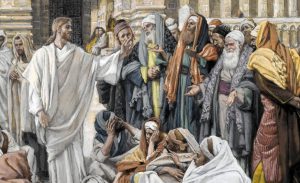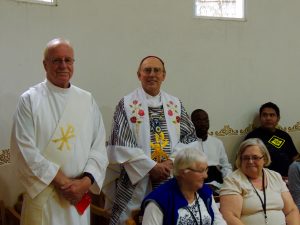Our Struggle with Unconditional Love
(Jer 26:1-9; Ps 69;Mt 13:54-58)
*****************************************
One of the traditional “seven sayings of Jesus” on the Cross is, “Father, forgive them, they know not what they do.” Renowned theologian Karl Rahner offers the following intriguing reflection on that saying: “Actually, they did know what they were doing. They were killing an innocent man. Pilate, the Roman soldiers, even the Pharisees and chief priests knew that. What they did not know was how much God loved them!”
The liturgy today invites us to overcome the scandal of the Cross, and to fully accept how unconditionally loved we are by God.
The Word Among Us provides us with this reflection on today’s readings. We might find it surprising how often Jesus offended people. There’s a great example in today’s Gospel, when the people of his hometown are at first amazed and then take offense at Jesus.
The Greek word Matthew used for “took offense” is skandalizo. It means to cause to stumble, to shock or offend. It’s also where we get the word “scandalize.” We might not normally think of Jesus as being scandalous – scandal is usually reserved for movie stars or political figures. But Jesus and his message can cause a kind of “scandal’ in us as well.
Think about all the shocking things Jesus did and said: he violated the rules of his religion by healing people on the Sabbath. He told his followers they must east his flesh and drink his blood to receive life. He said the Messiah, whom devout Jews expected to be a military leader, would give himself up to a violent death.

In each of these situations and many more, Jesus was presenting a message far beyond anything his hearers had imagined. He spoke of so much mercy, so much intimacy with God, so much unconditional love of God, so many blessings that God had in store for them. They were not used to such a message that stretched them beyond their usual way of thinking and seeing realty. They struggled with everything that unconditional love implied, so accustomed were they to their own version of sacrificial, meritocracy religion and the false gods of money, fame and power to which they were addicted.
Of course, it’s challenging – even scandalous – when we try to love as Jesus did. For many, it seems unreal and unrealistic. But each opportunity that arises gives us the chance to move beyond our initial discomfort. It invites us to extend our boundaries and step into a new way of thinking.
When we see a person begging on a street corner, we can push past our discomfort, stop and talk to him or her as well as offer them even our lunch money for the day. If someone has hurt us, and Jesus’ command to forgive seventy times seven times rankles us, we need to ask him to help us overcome our pain, reach out and take a step towards a healed relationship.
Whereas in the gospel the people are scandalized by Jesus and his gracious, offer of unearned unconditional love, in the first reading from Jeremiah, the people are hostile and resistant to a prophet who has the courage to confront their hypocrisy and lack of faith, and speak truth to power. One could say they were also scandalized, just in different ways and for different reasons.
The words of the prophets, and the words of Jesus in the gospels can appear to be scandalous to us because they ask us to go places we don’t expect to go, and to do things that would never occur to us to do. But they also bring us to a place that is better than we could have imagined.
Someone who in a very wonderful way kind of scandalized me was Deacon Francis Hyland on a pilgrimage to Our Lady of Guadalupe in Mexico City. During his homily one day, he recounted how he had remembered the words of Pope Francis to not just give money but to interact with the poor. Seeing a couple begging on the street, he knelt down, took the man’s hand, and asked if he could give him a blessing. Then he asked them if they could give him a blessing, and then gave them some money.

Deacon Francis, Bishop Sylvain at celebration with the Oblate scholastics in Mexico City
I was scandalized because I had also come across the same couple. I also stopped to talk to them and gave them some money, abut as my camera was hanging down right in front of me, I asked them not for a blessing, but if I could take their picture! As Francis was sharing his story teary-eyed, I felt convicted. He, a deacon, had blessed and was blessed by this couple – I, an archbishop, had asked to take their picture! He was teaching me how to related to the poor as Jesus would have us do – so that was a very beneficial, if painful, skandalizofor me.

Elderly woman in a market in San Cristobal, Chiapas, Mexico
The Eucharist, to this day, scandalizes people who struggle with depth of its spirituality, physicality and particularity. Jesus, the creator of the universe, Risen Lord and Savior of the world – is really present through Word and Sacrament for us – mere human beings.
How fortunate we are to be given the gift of faith both in Jesus and in the humble way he nourishes us in the Eucharist. May our celebration empower us to speak truth to power, and open us up to receive more fully his unconditional, un-earned love.




We should offer our support by donating money and giving money to the beggars , poor, homeless and people in need. We are ask to provide food for the hunger, offer them a drink for thirst, clothed the naked and shelter the homeless. If a beggar come to you asking you to help, are you going to ask them to go away and I have nothing. Are you offering some food money , money to clothed them and other accessories. Many of them are begging for love and care from God and from us. If we learn to love other people and respect others for who they are and forgiving people who have hurt us many times. Then we are able to offer the heart to love the poor and needy because they have no money and no power to do anything. They feel nobody cares and love them on this earth. We have to share the unconditional love by sacrificing ourselves and willing to pray for them, blessed them for any sins and heal them from any pain and sufferings. These people are also God’s people who is calling us for help. Amen Many Blessings !
Thanks for the loving and caring messages and teachings in offering unconditional love and support. I also been to Mexico City last year and I also saw the poor on streets and markets. Bishop Lavoie thanks for sharing those pictures. Blessings!